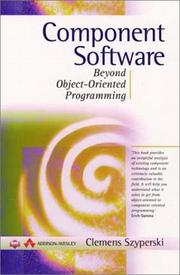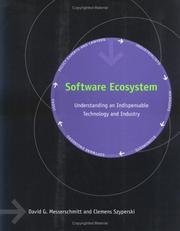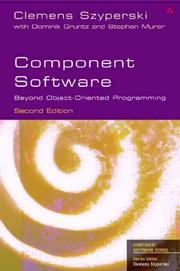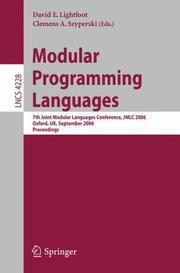| Listing 1 - 10 of 58 | << page >> |
Sort by
|

ISBN: 0201178885 9780201178883 Year: 1998 Publisher: New York (N.Y.): ACM
Abstract | Keywords | Export | Availability | Bookmark
 Loading...
Loading...Choose an application
- Reference Manager
- EndNote
- RefWorks (Direct export to RefWorks)
681.3*D15 --- Component software --- Object-oriented programming (Computer science) --- 681.3*C24 --- Computer programming --- Object-oriented methods (Computer science) --- Document Object Model (Web site development technology) --- Computer software --- Software: object-oriented programming --- Distributed systems: distributed databases distributed applications networkoperating systems --- Component software. --- Object-oriented programming (Computer science). --- 681.3*C24 Distributed systems: distributed databases distributed applications networkoperating systems --- 681.3*D15 Software: object-oriented programming --- 681.3*C24 Distributed systems: distributed databases; distributed applications; networkoperating systems --- Distributed systems: distributed databases; distributed applications; networkoperating systems --- 681.3*D210 --- 681.3*D32 --- 681.3*D32 language classifications: applicative languages; data-flow languages; design languages; extensible languages; macro and assembly languages; nonprocedural languages; specialized application and very high-level languages (Programminglanguages) --- language classifications: applicative languages; data-flow languages; design languages; extensible languages; macro and assembly languages; nonprocedural languages; specialized application and very high-level languages (Programminglanguages) --- 681.3*D210 Design: methodologies; representation (Software engineering) --- Design: methodologies; representation (Software engineering) --- Programming --- Composants logiciels. --- Programmation orientée objet (Informatique)
Digital
ISBN: 9783540409281 Year: 2006 Publisher: Berlin Heidelberg Springer-Verlag GmbH
Abstract | Keywords | Export | Availability | Bookmark
 Loading...
Loading...Choose an application
- Reference Manager
- EndNote
- RefWorks (Direct export to RefWorks)
Computer science --- Programming --- Computer architecture. Operating systems --- Computer. Automation --- programmeren (informatica) --- programmeertalen --- software engineering --- OS (operating system)

ISBN: 0262134322 9780262256667 0585482659 0262256665 9780585482651 9780262134323 9786612096624 1282096621 9780262633314 0262633310 Year: 2003 Publisher: Cambridge, Mass. MIT Press
Abstract | Keywords | Export | Availability | Bookmark
 Loading...
Loading...Choose an application
- Reference Manager
- EndNote
- RefWorks (Direct export to RefWorks)
Software has gone from obscurity to indispensability in less than fifty years. Although other industries have followed a similar trajectory, software and its supporting industry are different. In this book the authors explain, from a variety of perspectives, how software and the software industry are different--technologically, organizationally, and socially. The growing importance of software requires professionals in all fields to deal with both its technical and social aspects; therefore, users and producers of software need a common vocabulary to discuss software issues. In Software Ecosystem, Messerschmitt and Szyperski address the overlapping and related perspectives of technologists and nontechnologists. After an introductory chapter on technology, the book is organized around six points of view: users, and what they need software to accomplish for them; software engineers and developers, who translate the user's needs into program code; managers, who must orchestrate the resources, material and human, to operate the software; industrialists, who organize companies to produce and distribute software; policy experts and lawyers, who must resolve conflicts inside and outside the industry without discouraging growth and innovation; and economists, who offer insights into how the software market works. Each chapter considers not only the issues most relevant to that perspective but also relates those issues to the other perspectives as well. Nontechnologists will appreciate the context in which technology is discussed; technical professionals will gain more understanding of the social issues that should be considered in order to make software more useful and successful.
Computer software. --- Computer software --- Computer software industry. --- Logiciels --- Development. --- Développement --- Industrie --- REFERENCE --- Computer Science --- Engineering & Applied Sciences --- Computer service industry --- Development of computer software --- Software development --- Software, Computer --- Computer systems --- General. --- Software ecosystems. --- COMPUTER SCIENCE/General --- COMPUTER SCIENCE/Human Computer Interaction --- SOCIAL SCIENCES/Political Science/Public Policy & Law --- Ecosystems, Software --- Business networks
Book
ISBN: 9783540409281 Year: 2006 Publisher: Berlin Heidelberg Springer-Verlag GmbH.
Abstract | Keywords | Export | Availability | Bookmark
 Loading...
Loading...Choose an application
- Reference Manager
- EndNote
- RefWorks (Direct export to RefWorks)
On behalf of the Steering Committee we are pleased to present the proceedings of the 2006 Joint Modular Languages Conference (JMLC), organized by Oxford Brookes University, Oxford, UK and held at Jesus College, Oxford. The mission of JMLC is to explore the concepts of well-structured programming languages and software and those of teaching good design and programming style. JMLC 2006 was the seventh in a series of successful conferences with themes including the construction of large and distributed software systems, and software en- neering aspects in new and dynamic application areas. We were fortunate to have a dedicated Program Committee comprising 41 internationally recognized researchers and industrial practitioners. We received 36 submissions and each paper was reviewed by at least three Program C- mittee members (four for papers with an author on the Program Committee). The entire reviewing process was supported by the OpenConf system. In total, 23 submissions were accepted along with two invited papers and are included in this proceedings volume. For the successful local organization of JMLC we thank Muneera Masterson, Ali McNi?e and Fiona Parker and other sta? and student helpers of Oxford BrookesUniversityaswellasRosemaryFrameandJoKnightonandothersta?of JesusCollege,Oxford.TheproceedingsyounowholdwerepublishedbySpringer and we are grateful for their support. Finally, we must thank the many authors who contributed the high-quality papers contained within these proceedings.
Computer science --- Programming --- Computer architecture. Operating systems --- Computer. Automation --- programmeren (informatica) --- programmeertalen --- software engineering --- OS (operating system)

ISBN: 0201745720 9780201745726 Year: 2002 Publisher: New York ACM
Abstract | Keywords | Export | Availability | Bookmark
 Loading...
Loading...Choose an application
- Reference Manager
- EndNote
- RefWorks (Direct export to RefWorks)
Component software --- Object-oriented programming (Computer science) --- 681.3*D15 --- 681.3*C24 --- 681.3*D210 --- 681.3*D32 --- 681.3*D32 language classifications: applicative languages; data-flow languages; design languages; extensible languages; macro and assembly languages; nonprocedural languages; specialized application and very high-level languages (Programminglanguages) --- language classifications: applicative languages; data-flow languages; design languages; extensible languages; macro and assembly languages; nonprocedural languages; specialized application and very high-level languages (Programminglanguages) --- 681.3*D210 Design: methodologies; representation (Software engineering) --- Design: methodologies; representation (Software engineering) --- 681.3*C24 Distributed systems: distributed databases; distributed applications; networkoperating systems --- Distributed systems: distributed databases; distributed applications; networkoperating systems --- Computer programming --- Object-oriented methods (Computer science) --- Document Object Model (Web site development technology) --- Computer software --- 681.3*D15 Software: object-oriented programming --- Software: object-oriented programming
Book
ISBN: 3540878912 3540878904 Year: 2008 Publisher: Berlin : Springer,
Abstract | Keywords | Export | Availability | Bookmark
 Loading...
Loading...Choose an application
- Reference Manager
- EndNote
- RefWorks (Direct export to RefWorks)
This book constitutes the refereed proceedings of the 11th International ACM SIGSOFT Symposium on Component-Based Software Engineering, CBSE 2008, held in Karlsruhe, Germany in October 2008. The 20 revised full papers and 3 short papers presented were carefully reviewed and selected from 70 submissions. The papers feature new trends in global software services and distributed systems architectures to push the limits of established and tested component-based methods, tools and platforms. The papers are organized in topical sections on performance engineering; extra-functional properties: security and energy; formal methods and model checking; verification techniques; run-time infrastructures; methods of design and development; component models.
Software engineering --- Component software --- Development --- Computer software --- Information Technology --- Software Engineering --- Software engineering. --- Information theory. --- Computer science. --- Software Engineering/Programming and Operating Systems. --- Theory of Computation. --- Programming Languages, Compilers, Interpreters. --- Software Engineering. --- Programming Techniques. --- Models and Principles. --- Communication theory --- Communication --- Cybernetics --- Computer software engineering --- Engineering --- Informatics --- Science --- Computers. --- Programming languages (Electronic computers). --- Computer programming. --- Computers --- Electronic computer programming --- Electronic data processing --- Electronic digital computers --- Programming (Electronic computers) --- Coding theory --- Computer languages --- Computer program languages --- Computer programming languages --- Machine language --- Languages, Artificial --- Automatic computers --- Automatic data processors --- Computer hardware --- Computing machines (Computers) --- Electronic brains --- Electronic calculating-machines --- Electronic computers --- Hardware, Computer --- Computer systems --- Machine theory --- Calculators --- Cyberspace --- Programming

ISBN: 9783540409274 3540409270 3540409289 Year: 2006 Publisher: Berlin ; New York : Springer,
Abstract | Keywords | Export | Availability | Bookmark
 Loading...
Loading...Choose an application
- Reference Manager
- EndNote
- RefWorks (Direct export to RefWorks)
On behalf of the Steering Committee we are pleased to present the proceedings of the 2006 Joint Modular Languages Conference (JMLC), organized by Oxford Brookes University, Oxford, UK and held at Jesus College, Oxford. The mission of JMLC is to explore the concepts of well-structured programming languages and software and those of teaching good design and programming style. JMLC 2006 was the seventh in a series of successful conferences with themes including the construction of large and distributed software systems, and software en- neering aspects in new and dynamic application areas. We were fortunate to have a dedicated Program Committee comprising 41 internationally recognized researchers and industrial practitioners. We received 36 submissions and each paper was reviewed by at least three Program C- mittee members (four for papers with an author on the Program Committee). The entire reviewing process was supported by the OpenConf system. In total, 23 submissions were accepted along with two invited papers and are included in this proceedings volume. For the successful local organization of JMLC we thank Muneera Masterson, Ali McNi?e and Fiona Parker and other sta? and student helpers of Oxford BrookesUniversityaswellasRosemaryFrameandJoKnightonandothersta?of JesusCollege,Oxford.TheproceedingsyounowholdwerepublishedbySpringer and we are grateful for their support. Finally, we must thank the many authors who contributed the high-quality papers contained within these proceedings.
Modular programming --- Programming languages (Electronic computers) --- Langages de programmation --- Congresses. --- Congrès --- Computer Science --- Engineering & Applied Sciences --- Computer science. --- Computer programming. --- Software engineering. --- Programming languages (Electronic computers). --- Operating systems (Computers). --- Computers. --- Computer logic. --- Computer Science. --- Theory of Computation. --- Programming Languages, Compilers, Interpreters. --- Programming Techniques. --- Software Engineering. --- Operating Systems. --- Logics and Meanings of Programs. --- Computer science logic --- Logic, Symbolic and mathematical --- Automatic computers --- Automatic data processors --- Computer hardware --- Computing machines (Computers) --- Electronic brains --- Electronic calculating-machines --- Electronic computers --- Hardware, Computer --- Computer systems --- Cybernetics --- Machine theory --- Calculators --- Cyberspace --- Computer operating systems --- Computers --- Disk operating systems --- Systems software --- Computer languages --- Computer program languages --- Computer programming languages --- Machine language --- Electronic data processing --- Languages, Artificial --- Computer software engineering --- Engineering --- Electronic computer programming --- Electronic digital computers --- Programming (Electronic computers) --- Coding theory --- Informatics --- Science --- Operating systems --- Programming --- Computer programming --- Information theory. --- Logic design. --- Communication theory --- Communication --- Design, Logic --- Design of logic systems --- Digital electronics --- Electronic circuit design --- Logic circuits --- Switching theory --- Compilers (Computer programs). --- Compilers and Interpreters. --- Computer Science Logic and Foundations of Programming. --- Compiling programs (Computer programs) --- Computer programs --- Programming software
Digital
ISBN: 9783540776192 Year: 2008 Publisher: Berlin, Heidelberg Springer-Verlag Berlin Heidelberg
Abstract | Keywords | Export | Availability | Bookmark
 Loading...
Loading...Choose an application
- Reference Manager
- EndNote
- RefWorks (Direct export to RefWorks)
Computer science --- Computer architecture. Operating systems --- Computer. Automation --- informatica --- maatschappij --- computerbesturingssystemen --- programmeren (informatica) --- software engineering --- computernetwerken
Book
ISBN: 9783540776192 Year: 2008 Publisher: Berlin, Heidelberg Springer-Verlag Berlin Heidelberg
Abstract | Keywords | Export | Availability | Bookmark
 Loading...
Loading...Choose an application
- Reference Manager
- EndNote
- RefWorks (Direct export to RefWorks)
At the beginning of the 21st century, both software engineering and business application development are facing a variety of challenges. On the one hand, thereissigni?cantpressuretostreamlinethedevelopmentprocessandreducethe costs to create, deploy, and maintain software applications. On the other hand, software applications have to ful?ll constantly growing demands, in particular as they are being recognized as integral parts of an organization's competitive advantageand astheir signi?cant impact on the corporate(e-) business strategy becomes obvious. Nowadays, software applications have to satisfy rapidly evolving functional andextra-functionalrequirements.Similarly, the importanceofsoftwarein te- nical applications is also constantly growing, as more and more software c- tributes to the value of various products and technical processes. In both - mains,theenterpriseandthetechnicalproduct,softwarebecomesmoreandmore critical, as its failures can have dramatic impact on enterprises, users, and the environment. Cross-cutting these demands, managing the application compl- ity, ?exibly adapting applications to changes in the business environment, and reducing the development time are of primary concern in today's development projects. In order to better comply with these challenges, designing software archit- tures of good quality becomes a critical success factor. A software application is organized by its architecture that partitions it into elements and de?nes - lationships among them. For this, we usually use multiple views, each with a di?erent organizing principle. In addition, a software architecture supports r- soning about properties that are emergent and cannot be ascribed to particular elements. These properties are described using a language of quality attributes.
Computer science --- Computer architecture. Operating systems --- Computer. Automation --- informatica --- maatschappij --- computerbesturingssystemen --- programmeren (informatica) --- software engineering --- computernetwerken
Book
ISBN: 9783540358336 Year: 2006 Publisher: Berlin Heidelberg Springer Berlin Heidelberg
Abstract | Keywords | Export | Availability | Bookmark
 Loading...
Loading...Choose an application
- Reference Manager
- EndNote
- RefWorks (Direct export to RefWorks)
Software components are most generally viewed as a means of software re-use and, as such, much past research has been devoted to the study of problems associated with - tegrating components into cohesive systems. However, even when a collection of tru- worthycomponentshavebeensuccessfullyassembledthequalityoftheresultantsystem is not guaranteed. In December 2004, 41 experts on this topic from around the world, from research as well as industrial organizations, came together at Dagstuhl to discuss pressing issues related to architecting software systems from trustworthy components. Duringthecourseofthecold,yetsunny,DecemberdaysinDagstuhl,discussions- sions addressed topics such as compositionalreasoningon varioussystem-level prop- ties (such as deadlocks, live-locks etc.), compositional prediction models for different quality attributes (such as performance or reliability), blame analysis, interaction p- tocols, and composition frameworks. Using the liberal form of Dagstuhl Seminars, the days of the seminar were ?lled mostly with discussion in a variety of settings: in wo- ing sessions, around the table at meals, small groups in a corner, and also all together in the main meeting room.
Computer science --- Programming --- Computer architecture. Operating systems --- Computer. Automation --- programmeren (informatica) --- programmeertalen --- software engineering --- OS (operating system) --- computernetwerken
| Listing 1 - 10 of 58 | << page >> |
Sort by
|

 Search
Search Feedback
Feedback About UniCat
About UniCat  Help
Help News
News